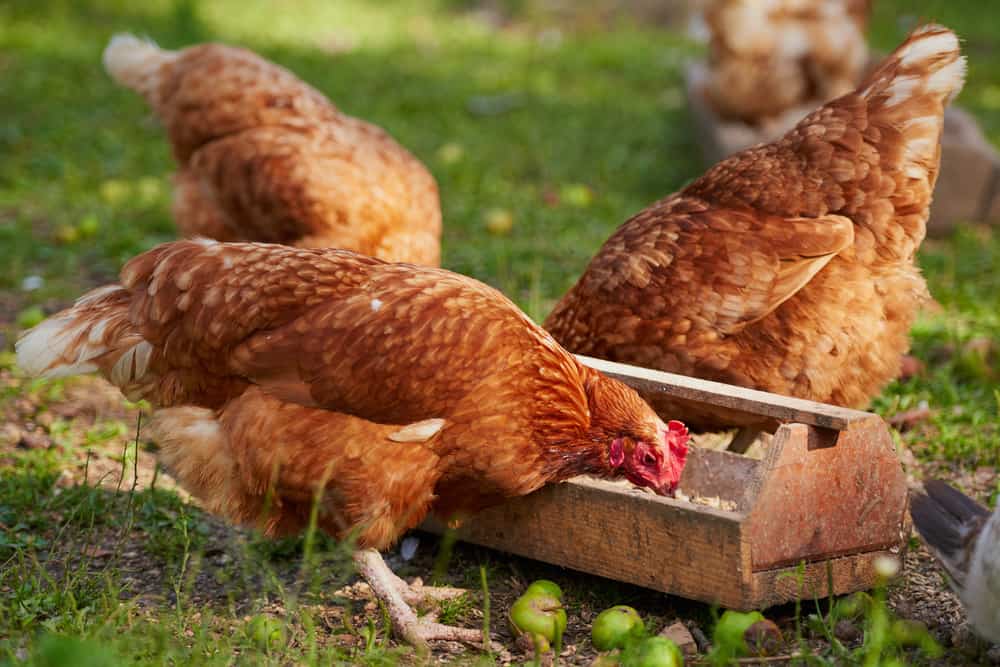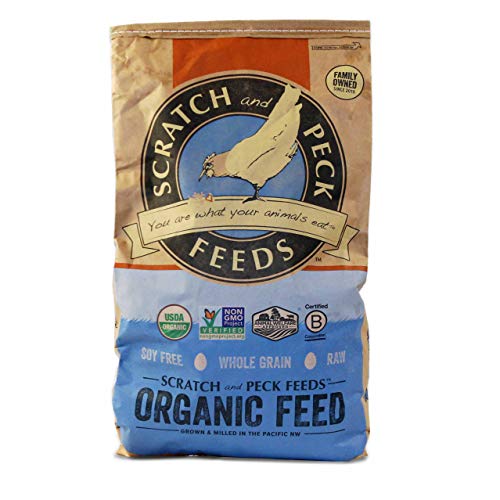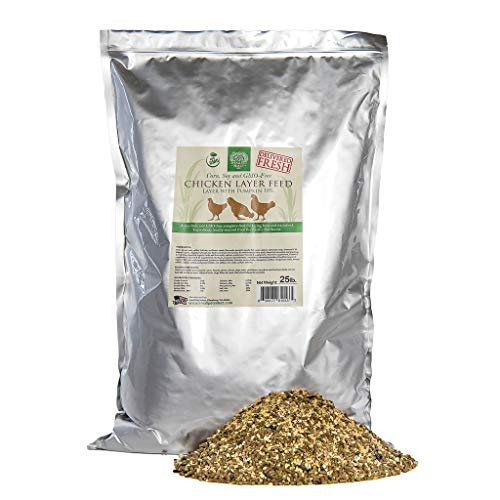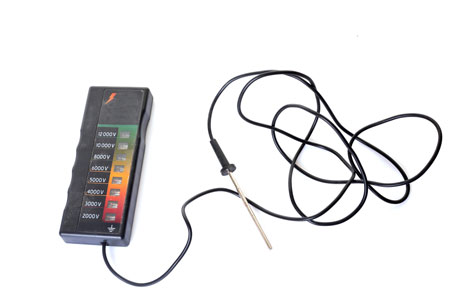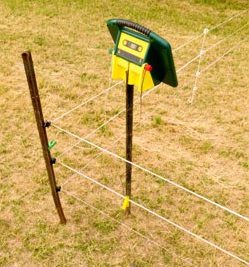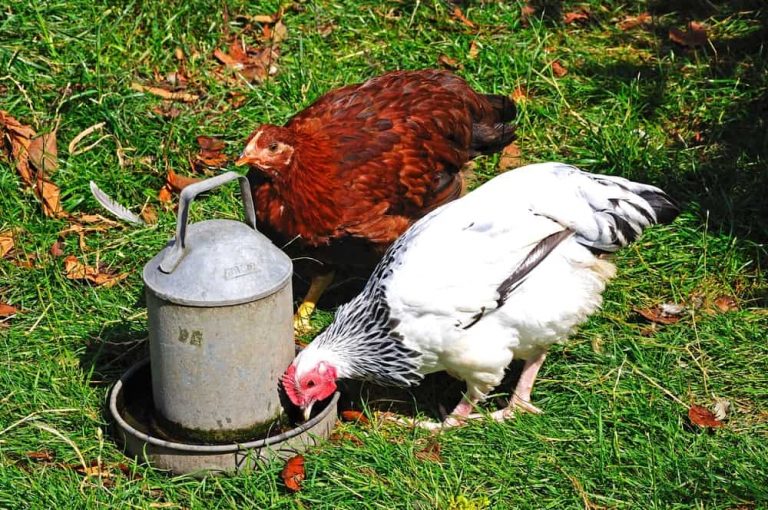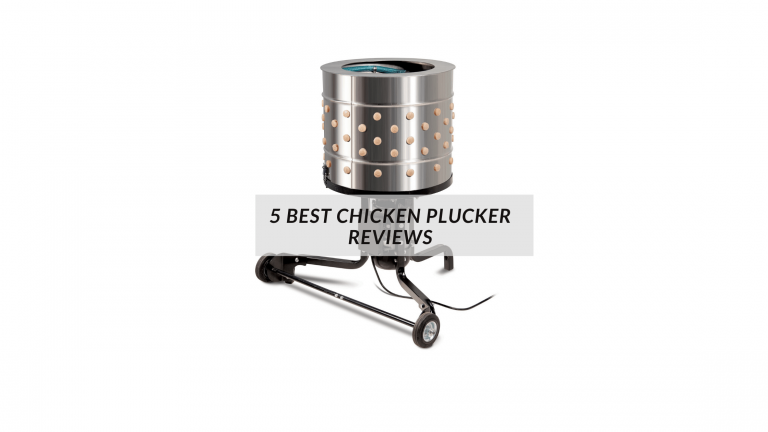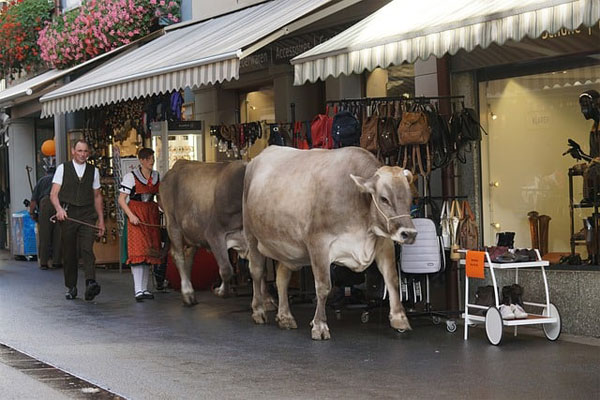What are the best chicken feeds out there, and how can you pick the right one for the type of birds you own? If that’s a question that you have asked yourself before, you’ll find out the answer while browsing through today’s post.
We’ll look at some decent alternatives in terms of chicken feeds, but we’ll also put together a comprehensive buying guide, a FAQ section, and provide you with all of the information you need to properly care for your backyard birds.
So, if you want to make an informed decision, keep on reading…
Image | Product Name | Size | Price |
1. Manna Pro Chick Starter Medicated Chick Feed | 5 LB | ||
2. Scratch and Peck Feeds | 25 LB | ||
3. Prairie’s Choice Non-GMO Backyard Chicken Feed | 25 LB | ||
4. Manna Pro Oyster Shell | 5 LB | ||
5. Small Pet Select Chicken Layer Feed | 25 LB | ||
6. Kalmbach Feeds All Natural Layer Pellet | 50 LB | ||
7. Kaytee Chicken Supplements | 3 LB |
Contents
Top 7 Best Chicken Feed Reviews
There are numerous types of chicken feeds available on the market today, but the most important factor based on which they are categorized is the age of the bird. Nutrition-wise, the best chick starter feed isn’t the same as the best chicken feed for laying hens, for example.
Here are some of the most effective feeds that we came across while doing our research. Check them out if you haven’t made up your mind yet.
Keep in mind that it would be best if you were to opt for an organic, non-GMO alternative just to be on the safe side of things for your birds and yourself.
1. Manna Pro Chick Starter Medicated Chick Feed
This starter feed has as much as 18% protein, which means that it naturally supports the growth of chicks, their muscle development, as well as their weight gain.
On top of that, it’s medicated, which means that coccidiosis isn’t going to be a problem you will have to deal with. Nutrition-wise, the Manna Pro Chick Starter includes vitamins and minerals so that your birds grow up healthy.
You’re allowed to feed this variety to your chicks until the age of 16 weeks.
Features
- Contains corn, soybean meal, wheat middlings
- Is enriched with calcium carbonate, ferrous sulfate, zinc oxide, and other minerals
- Contains niacin, riboflavin, thiamine
- It’s sold in 5-pound bags
Pros
- 18% protein promotes healthy development
- Contains added minerals and vitamins
- The crumble formula produces less waste
- Treats or prevents coccidiosis
Cons
- It’s not a non-GMO variety
- Some buyers say that instead of the crumble, the chicken feed was actually a powder
2. Scratch and Peck Feeds
Although it’s not as budget-friendly as other alternatives, the truth is that this feed is entirely worthy of your consideration as it is non-GMO and organic. It’s specifically made for egg-laying birds, so don’t try it if you raise backyard chickens for meat.
The feed can be given to birds that are older than the age of 20 weeks as the granulation is simply too large for younger birds. The best thing about this type of feed is that it lasts for a long time, even after you open up a bag.
What’s worth noting is that the layer feed contains just 16% protein, so it is unsuitable for meat chickens or for young chicks.
Features
- Contains organic wheat, barley, corn, ground limestone
- Has a healthy dose of fish meal
- Is enriched with a vitamin and mineral premix
- Contains sesame meal and flaxseed, both of which are organic
Pros
- Completely natural
- Non-GMO
- Suitable for a wide variety of birds from chickens to ducks and geese
- Specially formulated for egg layers
Cons
- Some farmers say that this formula smells like musty green potato peels
- It doesn’t come in bags larger than 25 lbs
3. Prairie’s Choice Non-GMO Backyard Chicken Feed
Similar to the product that we have showcased as our second favorite choice, this option is specially made for egg layers, so you can’t feed it to meat chickens or young chicks as they aren’t going to have the same performance.
The best thing about it is that it is compatible with every chicken breed, so that’s one less thing to worry about. The ingredients in this feed are non-GMO and non-chemically processed, which means that they are easier to digest by the birds.
To make sure that both the chickens and the eggs are healthy, the manufacturing company has enriched this formula with vitamins and minerals.
Features
- Contains corn and soymeal
- Has added salt and calcium
- Contains methionine
- Crumble size makes it work with any chicken breed
Pros
- Promotes egg laying
- Contains a healthy dose of protein, along with grains
- The texture is perfect and doesn’t allow any waste
- High-quality and easy to feed
Cons
- Less budget-friendly than other options
- Comes in 25-lbs bags with no other size options available
4. Manna Pro Oyster Shell
This one isn’t a chicken feed per se as it actually consists of oyster shells that have been crumbled so that they can be added to the regular diet that you feed to your egg-laying hens on a daily basis.
The formula is very rich in calcium, which means that you aren’t going to have any issues with the eggshell. Moreover, the mix is fermented, which means that the crumble promotes healthy digestion in your chickens and also helps them stay healthy.
You can start adding this type of oyster shell to your hens’ diet, beginning with the age of 18 weeks.
Features
- Pellet sized for easier ingestion
- The fermented formula promotes healthy digestion
- Contains oyster shell and minerals from corals
Pros
- Very rich in calcium
- Heat-treated formula guarantees hygiene
- Available in 5-pound bags, so you aren’t forced to buy a lot of it
- Healthy for egg layers
Cons
- Some say that chickens don’t eat their food as enthusiastically if it contains this mix.
5. Small Pet Select Chicken Layer Feed
Like some of the other options that we have described in our selection, this one is particularly designed for egg-laying hens. This means that it is rich in protein, but not to the extent that it fits more the nutritional needs of meat chickens rather than egg layers.
The best thing about the formula is that it’s corn-free and soy-free, and more importantly, non-GMO. You can, therefore, rest assured that you are feeding your backyard birds healthy food for healthy development.
As for the feed granulation, it’s worth noting that this one is a mix of protein pellets, seeds, and grains, all of which have different purposes.
Features:
- Corn-free
- Soy-free
- 6% crude fiber
- Min. 4% crude fat
- 18% crude protein
Pros
- Non-GMO, so you have nothing to worry about in this sense
- Rich in calcium and phosphorus
- Contains lysine and methionine, two essential amino acids
- Rich in omega 3 and oils from the seeds
Cons
- Some chickens can be picky, so they’ll produce waste instead of eating it all.
6. Kalmbach Feeds All Natural Layer Pellet
This is a feed for egg layers and meat chickens, and the nice thing about it is that it is rich in Omega amino acids, which are essential for sound development. The crumble also contains a higher calcium content, so there aren’t going to be any issues with the eggshell.
As for what it is composed of, this Kalmbach alternative is a mix of grains, corn, soybean meal, as well as wheat middlings. Some vitamin and mineral supplements have been added, and we all know how beneficial they can be.
It’s available in 40 or 50-pound bags, so you can pick the one that best suits your needs and budget.
Features
- Made with corn, soybean meal, wheat middlings, alfalfa meal, and flaxseed
- Contains added minerals (such as calcium carbonate, dicalcium phosphate, and others)
- Contains added vitamins (vitamin A, E, D3, Niacin, Vitamin B12, Riboflavin)
- Rich in amino acids (Lysine and methionine)
Pros
- It supports the health and development of egg layers
- Ensures that the eggshell isn’t going to be too thin
- This feed is fermented, so it has a positive impact on the intestinal flora
- All-natural
Cons
- Some buyers feel like it’s a bit too expensive for their budget
7. Kaytee Chicken Supplements
This one is a little different compared to the other products that we have described here, and that’s because it addresses the needs of fully adult chickens. It has an excellent balance of proteins and minerals, which means that it’s perfect for meat chickens, and egg layers.
Another aspect worth noting about the Kaytee choice is that it has omega 3 fatty acids, which have several benefits on all organs and systems — from the chickens’ eyes and heart to their brain and neurological system.
Moreover, the feed is enriched with a probiotic, which means that it supports healthy digestion through the bacteria in the birds’ gut.
Due to its content, the Kaytee product is not recommended for chicks — it fits the nutritional needs of adults only.
Features
- Contains cracked and ground corn, milo, wheat, and soybean meal
- Features added calcium carbonate
- Rich in amino acids (lysine and methionine)
- Contains vitamins (vitamin E, A, B12, and more)
Pros
- Perfect for adult chickens, whether for meat or egg production
- The crumble consistency promotes less waste
- Contains a probiotic to support optimal digestion
- The calcium and D3 are great for bones and eggshells
Cons
- Some hens don’t seem to want to eat the round pellets included in the crumble
Also Read: An In-Depth Guide on Feeding Backyard Chickens
Buying Guide
Finding the right chicken feed can be a little difficult if you’ve never raised backyard birds before, but we’ll help you make the right choice. Here are some of the most important factors that you should keep in mind when shopping for such a product.
Type of feed
Chicken feed can be categorized depending on several different aspects, but the age and purpose of your birds are two of the critical ones.
- Starter chicken feed
Starter chicken feed should be rich in calcium and have a lot more protein compared to the feed recommended for adult meat chickens and egg layers.
For example, the ideal starter chicken feed has about 20-24% protein, some calcium, and D3 for optimal musculoskeletal development, and is usually enriched with several vitamins and minerals.
Feeding starter feed is recommended until the age of 6 weeks. Don’t go beyond that threshold as the protein quantity is too much for older chickens, so they might put on too much weight or develop gout as a result (and not be able to move and feed themselves at all).
- Grower chicken feed
Teenage chickens have to be fed with feed that contains about 16 to 18% protein, which is something somewhat similar to what egg layers have to receive, too. This one isn’t particularly rich in vitamins and minerals, but it still contains some calcium and D3.
- Egg-layer chicken feed
Egg layers have to benefit from a diet that’s rich in minerals as they have a significant impact on their egg-laying capabilities and on the eggshell, too. This type of feed is among the richest in vitamins and minerals, but it doesn’t contain as much protein.
Most of the egg layer chicken feed we’ve come across has about 16 to 18% protein. It is completely unsuitable for small chicks due to the lower protein content.
- Chicken feed for broilers
Meat chickens have to get a lot of protein in their diet, but still not more than 22% for fear of them developing gout. The breeds you’ll raise for this purpose will grow quickly, so you aren’t going to have to wait for a long time for them to put on weight and muscle.
The birds have to be kept mobile, so the feed also has to contain a ratio of 2 to 1 of calcium and phosphorus. Probiotics support the broilers’ digestive health, and so do antioxidants and amino acids.
Medicated vs. non-medicated
Medicated feeds are usually given to chicks so as to prevent diseases that can affect their health to the point that they are lethal. In some situations, even egg-layer feed contains medication, especially against coccidiosis.
Non-medicated chicken feed is recommended for adult chickens who have been vaccinated and have received some sort of preventive or curative medication against coccidiosis.
Keep in mind that the eggs and meat of chickens that are undergoing treatment with medication are not safe for human consumption. You have to wait for the meds to be eliminated through the excretory system for a period of at least 7 days.
Quantity
An average-sized hen eats about one-quarter to one-third of a pound of feed per day. You can feed a variety of other things to her, including table scraps (fruit and veggies – without the seeds, pasta, rice, and others).
If you keep the maximum amount of 6 chickens per household that is allowed in some states, that means that you will feed your flock up to 1.8 pounds per day. Some varieties are available in 25-pound bags, whereas others are available in smaller sizes.
Organic, non-GMO, corn-free, soy-free
If you want to raise perfectly healthy chickens and you don’t want to risk anything in terms of your own health when you eat their eggs or meat, it would be best for you to choose such a product.
However, those that tick all the right boxes can be expensive, so you sometimes have to consider your budget besides the benefits that a chicken feed can offer to your birds and yourself.
Conclusion
We hope that our guide and product selection were able to give you a hand in selecting the best chicken feeds out there. By this point, you probably know what to look for in a brand of chicken feed, depending on what type of birds you keep (their age and their purpose).

